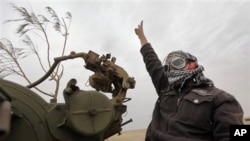Two more European Union countries say they will join Britain in sending military advisers to Libya to help rebel forces.
Italian Defense Minister Ignazio La Russa said on Wednesday that his country will send 10 instructors to help train the rebels who are battling forces loyal to Libyan leader Moammar Gadhafi.
Earlier Wednesday, France also announced that it will send military advisers for the Libyan rebels.
Separately, U.S. officials say President Barack Obama's administration plans to give the Libyan opposition $25 million in non-lethal assistance. The officials say the assistance could include items such as vehicles, fuel trucks, protective vests and non-secure radios.
Meanwhile, French President Nicolas Sarkozy met in Paris with the head of the rebels' transitional council, Mustafa Abdel Jalil. After the meeting, Jalil told reporters that he invited Sarkozy to visit the rebels' stronghold, the eastern city of Benghazi.
Britain announced plans on Tuesday to send about a dozen military advisers to Libya to help rebels work on organization, logistics and communications.
The U.N.'s human rights chief is warning the Libyan government that it may be committing war crimes by using weapons against civilians and medical facilities in the besieged city. In a Wednesday statement, High Commissioner for Human Rights Navi Pillay urged the government to halt the siege on the city.
Libya's foreign minister, Abdul Ati al-Obeidi criticized the dispatch of foreign military advisers, saying it will harm chances for peace in the country. In an interview with the BBC, Obeidi called for a cease-fire followed by a six month period to prepare for an election.
Fighting continued Wednesday between rebel and pro-government forces at the besieged western city of Misrata, where residents are pleading for international intervention. NATO airstrikes again struck government installations in several cities.
Leaders in rebel-held Misrata called for the urgent intervention of foreign ground troops to protect the 500,000 civilians there, the first such request by anyone among Libya's opposition forces.
The rebels' civilian leadership, the Transitional National Council, has however rejected the presence of foreign troops on Libyan soil to help their cause.
Some information for this report was provided by AP, AFP and Reuters.




